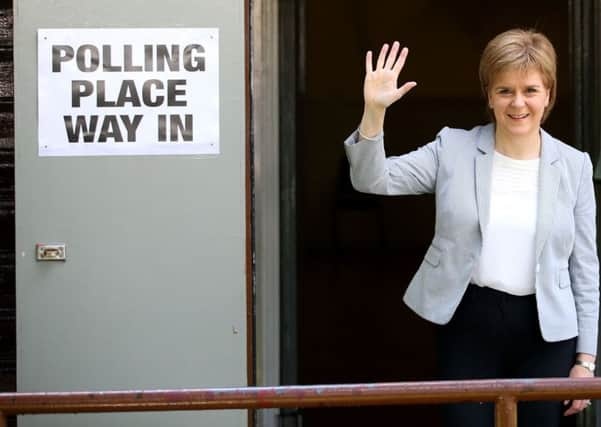Mark Stuart: Scottish indepedence is just a pipedream and no formailty '“ despite Brexit


While Sinn Fein’s demand for a referendum on a united Ireland will easily be blocked by the Unionists in Ulster, in Scotland, Nicola Sturgeon the First Minister has announced that a second Scottish independence referendum is now ‘highly likely’.
Her justification is the clear sentence in the SNP manifesto of 2016 which allows for another referendum if there is ‘a significant and material change in the circumstances that prevailed in 2014, such as Scotland being taken out of the EU against our will’.
Advertisement
Hide AdAdvertisement
Hide AdLet us be clear. The unfortunate outcome of the EU referendum was not of Sturgeon’s making. Ideally, she would have preferred to guide Scots more gradually towards independence over a much longer time period. However, as I hope to show, her response to these events is both premature and misguided.
Technically, the power to hold a referendum rests with the Westminster Government, but in reality, the next British Prime Minister will not stand in the way of the Scots holding a second referendum. Short of occupying Edinburgh Castle with troops dressed in red coats as in Bonnie Prince Charlie’s day, Westminster could not defy the sovereign will of the Scottish people.
The biggest hurdle for the SNP would not be securing a second referendum, but winning it. For a start, the vexed issue of Scotland’s ability to survive economically would resurface. A persistently weak oil price together with a shaky banking sector which has crashed once already would not inspire confidence in the international money markets.
In the last Scottish referendum campaign, in 2014, the SNP also failed to persuade the English to allow the Scots to use the pound sterling. This time around, option one would be to peg a new Scottish currency to the pound. Failing that, option two would be to persuade the Scottish people to accept the euro, a very difficult sell indeed.
Advertisement
Hide AdAdvertisement
Hide AdFor a start, large swathes of the Scottish business community would be opposed to the increase in transaction costs.
Moreover, the idea of joining the euro exposes the central contradiction at the heart of the SNP: why expend so much effort securing independence with one hand, if the plan is to give it all away to the EU with the other hand? Worse still, by taking this misguided approach, Sturgeon risks shackling her party and her country to the decaying corpse that is the European Union.
Another huge hurdle in the event of an independent Scotland joining the EU is that they would have to set up border controls between Scotland and England. Given that Scotland conducts 90 per cent of its trade through England, establishing check posts from Gretna Green to Berwick-upon- Tweed would be costly and nonsensical.
No one is questioning the right of the Scots to choose independence. Britain did not deny Ghana or Barbados their independence in the 1950s or 1960s just because of doubts about their economic viability as nation states. But the difference is that Scotland’s fate as a trading nation is inextricably linked with its larger neighbour.
Advertisement
Hide AdAdvertisement
Hide AdThe Union between Scotland and England has survived for 300 years precisely because it is to the mutual economic benefit of both nations. It benefits can be summed up in three words: profit, profit and profit.
Politically, Sturgeon possesses all the necessary communication skills to persuade the Scottish people of the rightness of her cause. Unlike 2014, she does not have the arrogance of Alex Salmond which point off many female voters.
But she will be pitted against a formidable opponent in Ruth Davidson, the Leader of the Scottish Conservative and Unionist Party, who will fight tooth and claw to safe the Union.
Davidson has already shown her formidable debating skills in the first Scottish referendum, together with her barn-storming performance in the Wembley EU debate held shortly before polling day. Using her brilliant forensic skills, she would rip apart the SNP’s flimsy economic case for independence.
Advertisement
Hide AdAdvertisement
Hide AdSturgeon was therefore wrong to make a hasty announcement about holding a second referendum for purely ideological reasons. She would be better waiting to see what deal she might be able to cut with the Westminster Government and the European Union.
In the months ahead, the new British Prime Minister, together with Angela Merkel, the German Chancellor, will want to strike flexible arrangements which may yet be to the benefit of Scots.
Besides, Scotland’s First Minister is forgetting the secret of the SNP’s success since the 1990s – gradualism. The constitutional settlement secured by Gordon Brown through the ‘solemn vow’ of September 2014 provides Scotland with major powers over taxation and spending.
If Sturgeon wants to see Scottish independence in her lifetime, she needs to demonstrate that her party can govern it competently using these new powers. Only then, will she persuade the Scots, the most cautious of all people, to take the next set of ‘baby steps’ to independence.
Mark Stuart, from York, is a biographer of John Smith and Douglas Hurd.